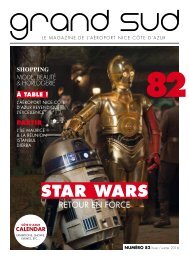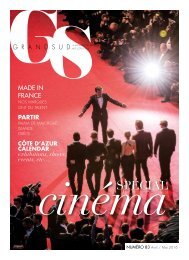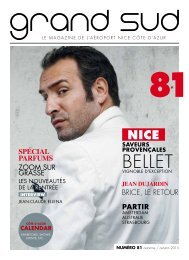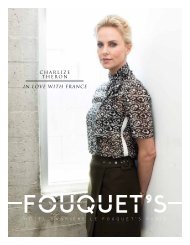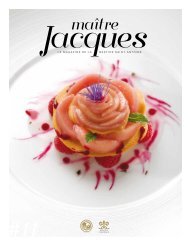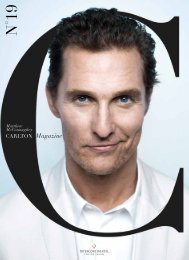Paris WorldWide #9
- No tags were found...
Create successful ePaper yourself
Turn your PDF publications into a flip-book with our unique Google optimized e-Paper software.
A<br />
grandmother tenderly rocks a newborn baby<br />
while her silver-haired husband looks on, smiling.<br />
The scene is unremarkable except for the<br />
fact that the grandmother is Hillary Clinton, a<br />
Democratic candidate for the next U.S. president,<br />
and the grandfather is a former U.S. president.<br />
Not to mention the fact that this photograph was<br />
posted on the Twitter account of Barack Obama’s<br />
former Secretary of State a few months before she<br />
entered the presidential campaign.<br />
Like the UK’s Margaret Thatcher and Germany’s<br />
Angela Merkel, Hillary Clinton has long appropriated<br />
masculine codes to build legitimacy: a strict<br />
look, sober outfits and a reputation for toughness.<br />
“Until the 1990s, the few women in politics were the<br />
exceptions and focused on neutralizing whatever<br />
reminded us that they were women,” emphasizes<br />
Frédérique Matonti, a professor of political science<br />
at University of <strong>Paris</strong> 1, Panthéon-Sorbonne.<br />
Today, the Democratic candidate is trying a new<br />
approach. By highlighting the loving granny and<br />
mother image (her daughter Chelsea is about to<br />
play a key role in the campaign), Hillary Clinton is<br />
moving closer to the younger generations, which<br />
revel in their status as women and leaders.<br />
GENDER EQUALITY, A PATH FRAUGHT WITH<br />
PITFALLS<br />
The times, and the laws, have changed. Since June<br />
2000, when France passed its gender parity laws in<br />
politics, over 120 countries around the world have<br />
adopted similar quotas. The French law establishes<br />
that half the candidates for European, regional and<br />
municipal elections (for cities with populations over<br />
3,500) must be women. Parties that fail to present<br />
equal numbers of men and women candidates are<br />
penalized. As a result, 15 years after the law was<br />
enacted, 48 percent of regional council members,<br />
47 percent of government members, 27 percent<br />
of MPs at the National Assembly, 25 percent of<br />
senators, and 16 percent of mayors are women. According<br />
to the Inter-Parliamentary Union (IPU),<br />
77 - paris Worldwide septembre/octobre<br />
september/october 2015



